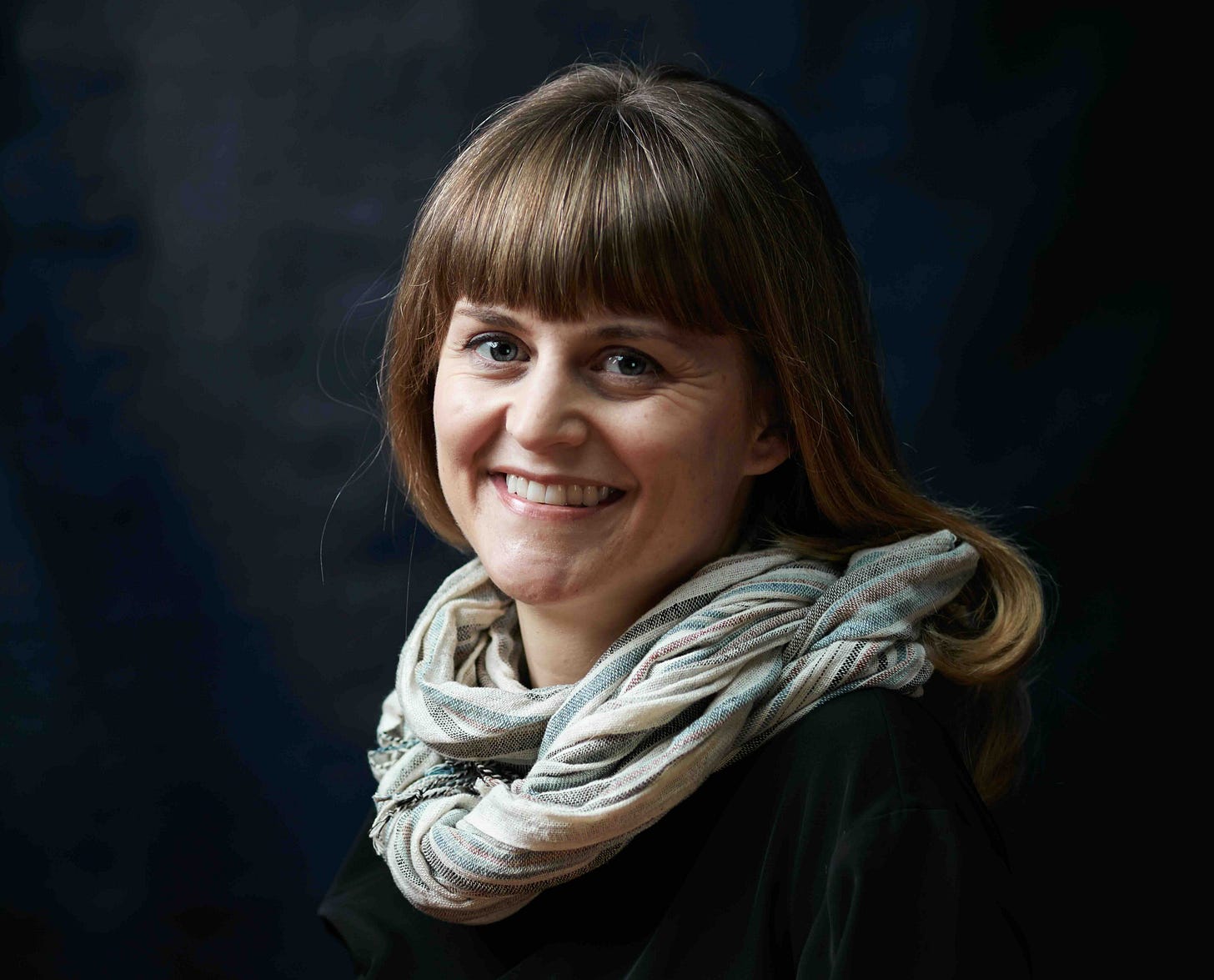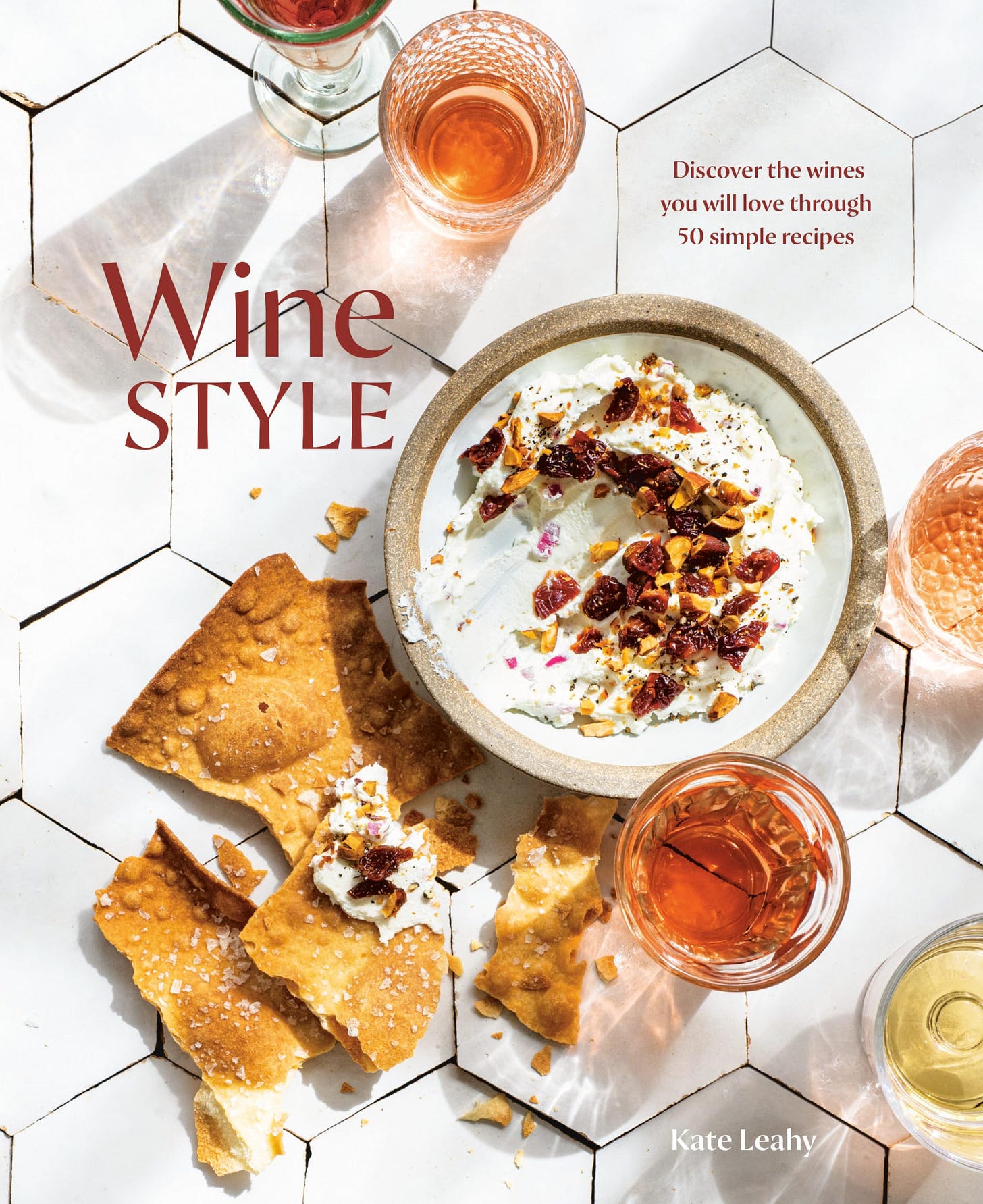Kate Leahy Is the Ultimate Cookbook Pro
She shares what (she hopes) AI means for the genre, the cookbook sections she often finds skippable, and a cover she's obsessed with.
Sometimes when I’m editing these Cookbookery Q&A’s I have to actively resist adding asides that might look like this: “[JH note: Agree!!!].” I remind myself that people are reading the newsletter to learn about what the interviewee thinks, not what I think.
I’m telling you this just to say that I wanted to put so many of those “I agree!” asides into this interview. Kate Leahy is a true cookbook professional. She’s written or collaborated on more than a dozen books, including Italian Wine, Wine Style, Lavash, My Egypt, and Burma Superstar. Her debut book, A16: Food + Wine, was named the IACP best book of the year and won the group’s Julia Child First Book Award.
Kate co-hosts the podcast Everything Cookbooks, which recently launched an accompanying Substack. For a cookbook fan or aspiring author, the podcast is fascinating, digging deep on various facets of the biz. Kate lives in San Francisco and is currently working with chef Esther Choi on a cookbook. She’s also writing a novel and will soon launch Author Lunchbox, a newsletter dedicated to helping people find novels to read and food to cook. (Swoon.) I subscribed, and you should too!
One of the things I wanted to talk to Kate about here was her book Wine Style (Bookshop/Amazon). When it was released in 2021, I was just starting to learn more about wine and intrigued by the notion of categorizing bottles not by grape or region, but by style, such as, in Kate’s words: crisp white wines, rich white wines, reasonably serious red wines, etc. Reading her descriptions of each style, I knew instantly which ones were my go-tos (sparkling, crisp whites, and picnic reds if you really want to know—see, I can’t help but share my own opinions).
The accompanying recipes are chic and simple, the photos are sunny and appealing. At under 200 pages, it’s an approachable book.
Thanks for chatting Kate—I loved your insights on cookbooks old and new, especially since I agreed with so many of them ;).
The Cookbookery Q&A with Kate Leahy
About how many cookbooks do you own?
KL: I wish I knew! I have about 200-plus out on shelves and then a bunch in storage for space reasons. But it's kind of a pain because I don't always remember which box they're in if I'm looking for a specific book. For instance, I know I have The Zuni Café Cookbook (Bookshop/Amazon) somewhere but can't find it!
What would you say to someone who questions why cookbooks still matter in our "digital age"?
KL: Trustworthy cookbooks stand the test of time in ways that digital often can't. I think that's why there are a lot of older books right now that are getting re-released. David Lebovitz is coming out with a new edition of Ready for Dessert (Bookshop/Amazon) this fall, and Norton published a 15th anniversary edition of My Bread (Bookshop/Amazon) by Jim Lahey and Rick Flaste last year. I wonder now if AI recipes generated by search will mean printed recipes that have been written and edited by real people will carry more meaning than ever. Not to say digital recipes won't hold up, but they'll have to live on trusted sites, not found through random searches.
What do you think people would find surprising about being a cookbook co-writer?
KL: Every time I start a new book with someone, it's like starting a new job. Every food person and chef I've worked with has specific ways they like to do things, and my job is to meld into their world. Often, the book is one of many things they're juggling, and I need to balance that with the realities of a publishing schedule. Also, so much of the work is project management.
Are you typically working on just one book at a time, either writing or co-writing?
KL: I prefer that, though sometimes the beginnings and endings of book projects overlap. In 2010-11, I worked on two books that came out in 2012, and I learned my lesson on how hard it is to juggle.
How did Wine Style come to be?
KL: Originally, I was going to write a book about wine pairing with Shelley Lindgren, my coauthor for other books. We were about to start work on a book on Italian wine together, and the publisher thought there'd be an opportunity for a small book about wine and food. Honestly, the reason I wrote it solo was time and budget. The advance wouldn't make sense to split between two people. I also ended up writing most of it during 2020, which was easier to do solo for logistical reasons.
What's one thing you wish were different about the book?
KL: Maybe the name? It's nice and short, but it's about types of wine, not, like, what to wear on a picnic :). Though I find titles to be one of the hardest things to get right.
What are you most proud of when it comes to Wine Style?
KL: I tried to take out a lot of the winespeak in the wine descriptions, which was challenging because most books I'd used for reference leaned toward jargon. It was little things, such as calling wine grapes "grapes" rather than "berries," which is what a lot of wine books traditionally called grapes. And I worked hard to make it easy to read.
What do you find boring in a cookbook?
KL: This is going to be unpopular, but I find there's a lot more personal story in cookbooks that doesn't do a heavy enough lift justifying why it's in the book. It's important to get stories into cookbooks, and I know how hard it is to get them to flow well in the text. When it works, it's great. But often it's skippable.
Also, I know a lot of people think equipment/pantry sections are boring, but because so many people have said that, cookbook writers and graphic designers are approaching them in fresh ways. Betty Liu's book The Chinese Way (Bookshop/Amazon) has a great ingredient/equipment section.
What's a cookbook cover you're obsessed with?
KL: I love the cover of Sicily, My Sweet (Bookshop/Amazon) by Victoria Granof. In person, you can feel the texture and the gloss/matte contrast. Plus, it has a great spine that echoes the cover graphic. I am a sucker for a great spine.
What's a cookbook that you think didn't get enough attention?
KL: So many! It's hard to cut through the noise today. I don't know how much attention it got, but I think Amy Thielen's Company: The Radically Casual Art of Cooking for Others (Bookshop/Amazon) is so beautifully written that people could teach food writing out of it.
What’s one book you’re sheepish to admit you’ve never cooked out of?
KL: Since I just answered the previous question, I admit I've never cooked out of my copy of Company: The Radically Casual Art of Cooking for Others.
Interview has been lightly edited. If you purchase a book through one of these links, I may receive a small commission.
More to Nibble On
My IRL cookbook club happened on Saturday. We cooked from Hot Date! and the upcoming Sesame. It was a feast.
Fall is going to be LIT when it comes to cookbooks. Hetty McKinnon has a new one too.
I joined the Dishing with Stephanie’s Dish podcast to chat about Cookbookery Collective. Thanks for having me on the show Stephanie!
This week’s NYT Bestsellers: By Heart by Hailee Catalano. Congrats!
What I cooked this week: Lucinda Scala Quinn’s Savory Easter Pie from Mother Sauce (watch this space next week for Lucinda’s Cookbookery Q&A!), Jessie Sheehan’s Easiest Ever Flourless Chocolate Cake, and the Smashed Ranch Cucumbers from Chinese Enough by Kristina Cho.
If you enjoyed this post, please click that cute little heart! And tell me in the comments, what’s a cookbook you think didn’t get enough attention? I could name several, but when I answered the Cookbookery Q&A myself, I said Masala.








![Ready for Dessert, Revised: My Best Recipes [A Baking Book]: Lebovitz, David: 9780593836293: Amazon.com: Books Ready for Dessert, Revised: My Best Recipes [A Baking Book]: Lebovitz, David: 9780593836293: Amazon.com: Books](https://substackcdn.com/image/fetch/$s_!81jp!,w_1456,c_limit,f_auto,q_auto:good,fl_progressive:steep/https%3A%2F%2Fsubstack-post-media.s3.amazonaws.com%2Fpublic%2Fimages%2Fd1387a65-b205-4f4f-994b-0554e7d16830_805x1000.jpeg)
![Sicily, My Sweet: Love Notes to an Island, with Recipes For Cakes, Cookies, Puddings, and Preserves [Book] Sicily, My Sweet: Love Notes to an Island, with Recipes For Cakes, Cookies, Puddings, and Preserves [Book]](https://substackcdn.com/image/fetch/$s_!5tUu!,w_1456,c_limit,f_auto,q_auto:good,fl_progressive:steep/https%3A%2F%2Fsubstack-post-media.s3.amazonaws.com%2Fpublic%2Fimages%2Fe6bc2d62-65f4-4428-9062-2154b24c6a62_1400x1856.jpeg)
![Company: The Radically Casual Art of Cooking for Others [Book] Company: The Radically Casual Art of Cooking for Others [Book]](https://substackcdn.com/image/fetch/$s_!SHmq!,w_1456,c_limit,f_auto,q_auto:good,fl_progressive:steep/https%3A%2F%2Fsubstack-post-media.s3.amazonaws.com%2Fpublic%2Fimages%2F8f14afe4-9785-461c-a57f-9f420e28e52a_965x1200.jpeg)
What a happy surprise to find my bawdy pink bookcover here! Thanks for this, Jenna. (and Kate!) I’m loving your newsletter.
I'm a huge fan of Company, too. And a HUGE fan of Kate!